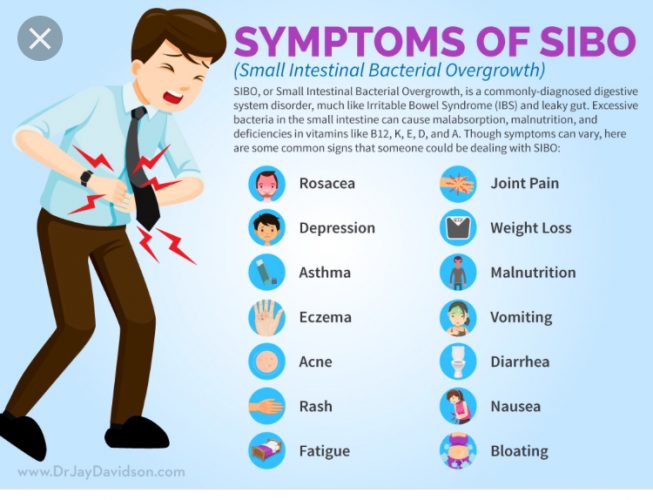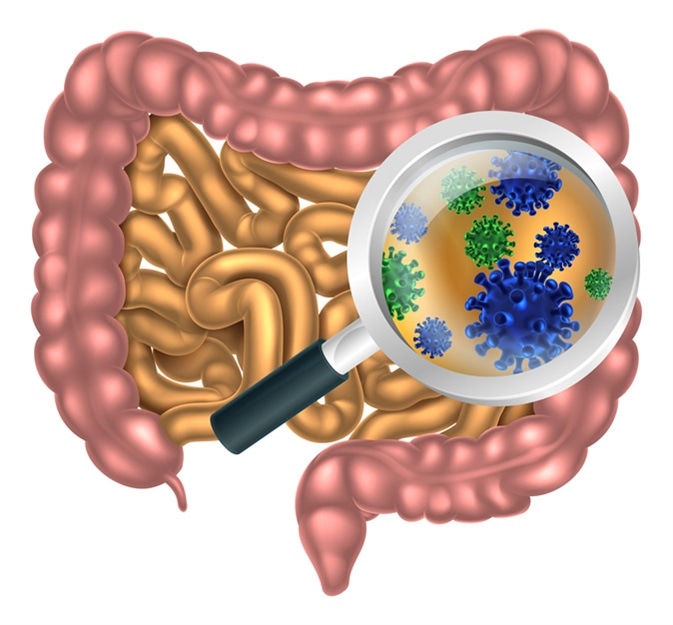Small intestine bacterial overgrowth. This happens when bacteria that normally grows elsewhere in the gut takes residence in the small intestine.
This is a serious condition that can have a big negative impact on your health, well being and obviously training and racing.
Normally: the bacteria that we are chatting about, which are of the “GOOD” kind. These friendly bacteria usually live in the colon where they help to digest soluble fiber and makes vitamins/minerals that the body needs.
In other words – which leads to …
- Too many friendly bacteria find their way to small intestines
- Bacteria flourishes and robs cells/body of simple carbs/sugars and interferes with nutrition absorption. In other words, the bacteria (now in a nutrient dense environment) complete for resources that your body needs. Overgrow can happen easily because of the nutrient rich (sugary foods) environment.
- Releases gasses – bloating, gas, nausea, vomiting, cramping
- Food / carb / nutrient absorption for the body is interrupted or negatively impacted. Especially vitamin B12.
- The bacteria that is eating with WILD ABANDON release gases that hurt the body by being released too far up the GI tract.
- Absorption problems can lead to malnutrition. Not having enough B12 is a very serious thing for the entire body. Then perhaps add that you are vegetarian. Are you actually absorbing the B12 that you might be taking? Same with meat eaters as well … where we naturally “get B12”. Fatigue, anemia, or brain fog.
- Fats are harder to break down . So you can become deficient in fat soluble vitamins.
- Carbohydrate absorption is affected as well, as the bacteria gets at it first.
- Contribute to Leaky Gut but causing inflammation of the tight junctions and affecting permeability.
- Villa in the gut get damaged further causing absorption issues.
- Inflammation and thinning of the mucosal lining.
SIBO IS BECOMING MORE AND MORE OF AN ISSUE
Currently 64% of folks going to GI specialists have found at SIBO is involved. They are saying that about 60% of folks with IBS are caused or can be traced back to SIBO.

Symptoms
- Pain in stomach, especially after eating
- Bloating
- Cramps
- Diarrhea / constipation
- Indigestion
- Regular feeling of fullness
- Gas
- Fatigue, anemia, brain fog
Causes

- Deficiency in the migrating motor complex MMC. Motility issues resulting in food and bacteria not passing through properly.
- Series of movements/contractions to move food particles/bacteria out of the stomach and small intestines. MMC works between meals, cleaning. The moment food is in the mouth, the MMC stops. Works every 90 to 120 minutes. 2 hour process. Sweeps bacteria out of the small intestines into the colon where it belongs.
- The MMC is most stunted by food poisoning and diabetes. In the case of food poisoning, whatever virus, bacteria or parasite gives off a toxin that damages nerves thus slowing down the MMC. It does this so your body can not get rid of it. Make sense? Smart of them. Diabetes also causes nerve damage that results in slower MMC movement/functionality.
- Eating too frequently can alter the MMC “waves”. If you are eating you are not cleaning. This is one of the underlying reasons that intermittent fasting helps. More cleaning going on.
- Defect in the ileocecal valve.
- Valve that separates the small and large intestine. This allows a “reflux” type action to happen, allowing bacteria to “flow” back up into the small intestines. Infection. Parasite. Some other issue with undigested food.
- Structural defects from surgery or diverticulitis
- Pouches form in the small intestines where bacteria can make a home in and grow.
- This causes behind this are not for sure yet, tho a diet low in fiber might contribute. Also, when the stool is hard and the colon has to over exert itself, it can weaken the intestine wall, causing pouches to form.
- Diverticulitis is where inflammation occurs due to this bacteria overgrowth and stress on the gut lining/environment. Most cases of diverticulitis do not form in the small intestines.
- Intestine surgery, including stomach stapling can predispose an individual to SIBO.
- Compromised digestion due to low stomach acid and digestive enzymes. pH issues.
- Stomach acid can normally kill off unwanted bacteria. But when it is low it can’t do its job. So bacteria will collect in the small intestines. The use of antacids and proton pump inhibitors also contribute to SIBO, medications used for acid reflux. These medications can temporarily bring relief but long term they do not help the root cause and can make it worse. Any medication that affects the pH of the stomach acid, meaning make it LESS acidic can contribute to SIBO.
- Weakened immune system
- Normally the immune system can take care of the bacteria when they grow out of place and the toxins that they produce. If they immune system is low there aren’t enough resources to handle the stress. FYI. Keep in mind that chronic stress weakens the immune system. A weakened immune affects the MMC directly or if you take antibiotics this causes a VOID in the gut where opportunist bacteria can take over and grow like wild fire. Making the whole situation worse.
SIBO IS STUBBORN AND CAN REOCCUR
Some studies show a reoccurrence rate of 45%. Relapse can happen in a few days, weeks or months. Most common reoccurrence is within a couple weeks to months where it is being show that 70-80% of SIBO cases/reoccurrence is due to MMC issues. In these cases getting rid of the overgrowth is only 1/2 the battle. Repairing MMC functionality is key.
Risk factors: Crohn’s, diabetes, scleroderma, HIV, Parkinson’s, hypothyroidism, medications that slow down the bowel, like narcotics, ? Mag low?
To test for: breathe (bacteria releases hydrogen and methane) (fasted), blood, fecal, other
Natural Antimicrobials:
- Cinnamon
- Coptis
- Indian barberry
- Lemon Balm
- Neem
- Oregano
- Red Thyme
Fixing
- Feed the bacteria to bring them out and medicate
- Low residue diet, less fiber, work on root cause
- Lifestyle – support Migrating motor complex, between the meals activity in the gut to get food and bacteria to large intestines.
- Several hours between meals
- 3 meals a day
- Eliminate snacks
- Avoid eating at least three hours before bed
